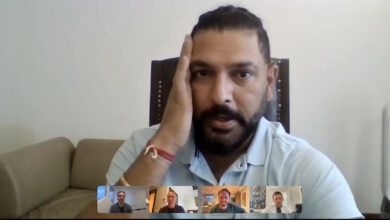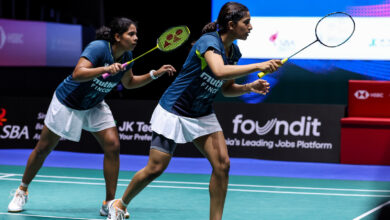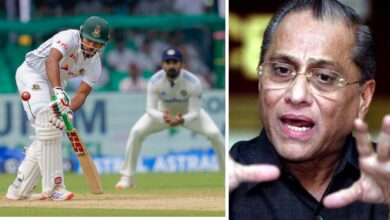Before big final, Morocco vs Croatia in ‘cruelest match’, the third-place playoff

BEFORE THE World Cup heads for the Lusail Iconic Stadium, a shimmering bowl amidst gleaming sky-risers on the outskirts of Doha, it stops at the Khalifa Stadium, the oldest stadium in the country refurbished with a dramatically swooping upper rim, nestled in the heart of the ambitious city. The world waits breathlessly for Sunday’s final between Argentina and France at the Lusail; the third-place playoff between Morocco and Croatia remains largely an afterthought, but not without stakes, context, or thrill.
its sheer design, it’s a strange contest. Two teams with their title ambitions quashed, the semi-finals defeat still haunting and tormenting, the ifs and buts swirling in their mind, their dreams shattered, their tired bodies, still recovering, have to bury all those, the drain of both mind and body, to fight for a bronze medal, which could barely be a consolation when weighed with the immediacy of the semi-finals heartbreak.
Croatia’s manager Zlatko Dalic concurred, “It’s difficult for players to pick themselves up from the defeat, but it’s an opportunity to leave on a winning note, with a medal, with our pride in place.”
1⃣9⃣9⃣8⃣ 🥉2⃣0⃣1⃣8⃣ 🥈2⃣0⃣2⃣2⃣ ❓ #FIFAWorldCup #Qatar2022 #Family #Vatreni❤️🔥 pic.twitter.com/X0KXiifzbm
— HNS (@HNS_CFF) December 16, 2022
So did his Morocco counterpart Walid Regragui: “I guess it’s the worst game that we have to play,” Regragui told reporters on Friday. “But we’re still excited to play it, despite the disappointment. We obviously would have liked to be in the actual final, but there is third place we play for. We want to finish on the podium.”
Horically, it has been a fixture that managers and players have loathed. Azeglo Vicini, Italy’s manager in the 1990 edition at home, called it a “punishment for the players, spectators and the soul of football.”
For Dutch manager Louis van Gaal, “this match should never be played”. Before his team’s playoff game against Brazil in the 2014 edition, he questioned its relevance: “I have been saying this for the past 10 years. We will just have to play the game, but it is unfair. We will have one day less to recover and that’s not fair play. The worst thing is, I believe, there is a chance that you lose twice in a row in a tournament in which you’ve played so marvellously well. You go home as a loser because possibly you’ve lost the last two matches.”
None of these voices made FIFA rethink – primarily for commercial reasons – but it’s not like the game is without any meaning, significance or horical value. England manager Gareth Southgate lent perspective: “Two days after losing the semi-final, it might look like the cruelest match you would ever play, but later, when you reach home, you wish you had at least a medal to show for your efforts.”
There is even more context this time. Though both teams would likely field a second-choice side, this could turn out to be Luka Modric’s farewell game for his country. So could it be for Dejan Lovren and Matteo Kovacic, two others who provided yeoman’s service to Croatian football. Modric (37), though, has been exceptional in the tournament, modulating the game’s pulse, controlling the game with his velvet-wrapped bullets of passes. Even if he chooses to watch from the bench, spectators would flock to watch the masterly midfielder for possibly his last time for the country.
It’s not like the stands would be scantily-populated. According to FIFA’s website, the tickets have been sold out well in advance. Those on the resale platform would be immediately gobbled up Morocco’s fans, who would turn out in numbers to form a fierce wall of red. One of them, Salim Hossein says: “Definitely, we would go and push them for bronze. If someone had told me before the tournament that we would be fighting for third place, I would not have believed him. Third place would be a great achievement for the country.”
Yet another reason to tune in: Third-place playoffs tend to be goal-festivals, unlike the final that tends to be stifled, tactical games. The last 10 World Cup finals tournaments have produced an average of 2.5 goals per game. The average number of goals in third-place playoff matches during that same 40-year period is 4.1. Unshackled pressure, even defensive teams embrace an open game.
There have been some classics too, like the 3-2 game between Joachim Low’s Germany and Oscar Tabarez’s Uruguay, or the same scoreline that Turkey and South Korea produced in 2002. Some of the greats have vented out their frustration of losing the semi-finals in his fixture. French forward Just Fontaine hammered four in 6-3 thrashing of Belgium in 1958, taking his goal tally to 13 in the tournament, still the record haul for any player in a single tournament.
There have been the odd shades of controversies too. In the very first edition, Yugoslavia and USA were supposed to play against each other. But whether the match was held is lost in intrigue. In 1984, FIFA published a bulletin that Yugoslavia had won the playoff 3-1. But football horians claimed that the match did not happen because Yugoslavia refused to play, angered at the horrific refereeing in the semi-final against hosts Uruguay, and so the bronze was awarded to USA on superior goal difference.
But in 2010, the son of Kosta Hadzi, the head of the Yugoslav delegation at the 1930 tournament, claimed his country had been awarded one bronze medal for the entire team, which he had kept as part of his personal collection. The controversy was never doused, and is probably waiting for a context to resurface.Subscriber Only StoriesPremiumPremiumPremiumPremium
So the Khalifa stop could be worth stopping for, to watch Modric for perhaps the last time in his Croatia colours, to len to the raucous cheering of the Moroccan fans, a potential goal-roll or even a scent of controversy.






